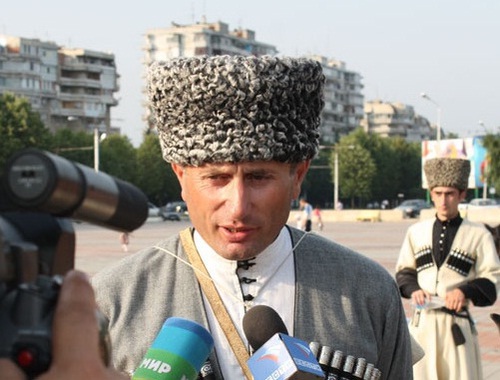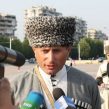
Disappointed in Moscow, Russian Circassian Activist Hails Georgia’s Approach to the North Caucasus
Publication: Eurasia Daily Monitor Volume: 10 Issue: 95
By:

In an interview with the Kavkazskaya Politika website, the well-known Circassian activist Ibragim Yaganov said Russia must take steps to alleviate the hardships it inflicted on the Circassians. Yaganov contrasted Russia’s policy of stubborn silence on the Circassian issue to the European colonial powers, which have been quite apologetic for colonialism. The Circassian activist said that even the Georgians surprised him with their frankness when they told him: “We do not refuse to admit that we participated in the Russian-Caucasian war. Many Georgian officers and Georgian militia fought in the ranks of the Russian army in the Caucasus. To repay for our part of the responsibility for participating in the Russian-Caucasian war, we recognize the Circassian genocide. At our own expense we are erecting a monument for the victims of that genocide and offering [the Circassians] to establish all kinds of relationships with us on the basis of our laws and the most favorable regime for them in the fields of education, healthcare, art and so on” (https://kavpolit.com/tyazhelo-byt-cherkesom).
Georgia’s image among the Circassian activists in the North Caucasus underwent a dramatic change in May 2011, when the Georgian parliament officially recognized the Circassian “genocide,” making Georgia the first country in the world to do so. The importance of this recognition is emphasized by the fact that Georgia is a neighboring country, bordering every republic on the northern slopes of the Caucasus Mountains, and has always had influence in the North Caucasus.
Ibragim Yaganov fought against Georgia in the Georgian-Abkhaz war of 1992–1993. According to Yaganov, the Circassians at the time thought that Abkhazia would become a “window to the outside world” for them. Instead, he said, Georgia, not Abkhazia, has now become a window to the outside world for the Circassians. “We fought for a free, independent Abkhazia,” he said. “After twenty years we see that Abkhazia has neither independence, nor freedom, nor a state. There is not even an economy. Practically, I believe that the current Abkhaz authorities betrayed the idea for which so many people fell and so much blood was spilled” (https://kavpolit.com/tyazhelo-byt-cherkesom).
Back in February, some news agencies reported that Moscow was putting pressure on the new Georgian government of Bidzina Ivanishvili to withdraw its recognition of the Circassian “genocide.” The deputy minister for diasporas in Mikheil Saakashvili’s government reportedly reached out to the Circassian diasporas and warned them to put pressure on Ivanishvili’s government to prevent it from backing away from the “genocide” recognition. Sources said Moscow was especially concerned about the Circassian “genocide” issue in the run-up to the 2014 Winter Olympics in Sochi, which will take place on historical Circassian lands (https://kavkasia.net/Georgia/2013/1359866721.php). Yaganov, who recently visited Georgia, said that despite the ongoing internal political struggles in the Georgian establishment, Georgia’s policies toward Circassians and the North Caucasus have remained broadly intact. Georgia is still keen on expanding its relations with the North Caucasus in the humanitarian sphere. Illustratively, the Tbilisi-based Circassian Cultural Center—created at the initiative of President Saakashvili in 2011 (https://www.georgiatimes.info/en/news/65709.html)—continues to operate (https://kavkasia.net/Georgia/2013/1369081702.php). The Circassian Cultural Center has established joint cultural exchanges with organizations in the North Caucasus and has actually hosted Yaganov to speak on several occasions. Similarly, Caucasian House, established in 1999 to carry out a number of educational, peacekeeping, general and cultural projects, also did not stop functioning, but expanded its cooperation to other regions of Russia, apart from the North Caucasus (https://www.kavkaz-uzel.ru/articles/222493/).
It is remarkable that Georgia’s outreach program to the North Caucasus has survived the country’s change of government. This is probably one of the few Saakashvili policies that Ivanishvili, his successor, has not scrapped. As the Georgian Dream coalition promised after it won the elections in October 2012, the program for establishing Georgian-North Caucasian connections became much less politicized, but did not disappear. This indicates that the Georgian leadership sees long-term value in closer relations with the North Caucasus.
As a prolific Circassian activist, Yagonov painted the state of affairs of the Circassian organizations in the North Caucasus in bleak colors. “In 2000, when the authorities established full control over the International Circassian Association, they simply destroyed it,” he said. “That is why I do not participate in that organization, it does not exist for me.” According to Yaganov, the current head of the International Circassian Association, Khauti Sakhrokov, was appointed “almost after consultations with [President Vladimir] Putin himself” (https://kavpolit.com/tyazhelo-byt-cherkesom). A Kabardino-Balkarian bureaucrat, Sakhrokov was elected head of the Circassian organization in October 2012. Reportedly, most Circassians were in favor of Vyacheslav Derev, a Circassian businessman from Karachaevo-Cherkessia, but the Russian leadership, including Putin, spoke out against his candidacy (https://circassiatimes.com//611-velikie-posidelki-v-mcha.html).
Even in normal times, Putin emphasized that the North Caucasus should be governed through “manual control,” meaning handpicking candidates for every possible position that has the slightest political or administrative consequences (https://archive.premier.gov.ru/events/news/11301/print/). It is plausible that in the run-up to the Olympics in Sochi, the Russian government’s handpicking exercise culminated in appointing even the heads of Circassian non-governmental organizations. Since many Circassians in the North Caucasus are hostile to the Olympics in Sochi and the region is bound to attract unusually large international interest, Circassian non-governmental organizations (NGO) became natural targets of Russian government scrutiny. With the government apparently paying so much attention to Circassian organizations in the North Caucasus, it means that civil activism is an influential force that cannot be simply ignored by Moscow. So Circassian activists might want to use this opportunity to establish themselves firmly as independent actors that could defend the rights of their constituents not only during the frenzy of the Olympic Games, but after they are over.




